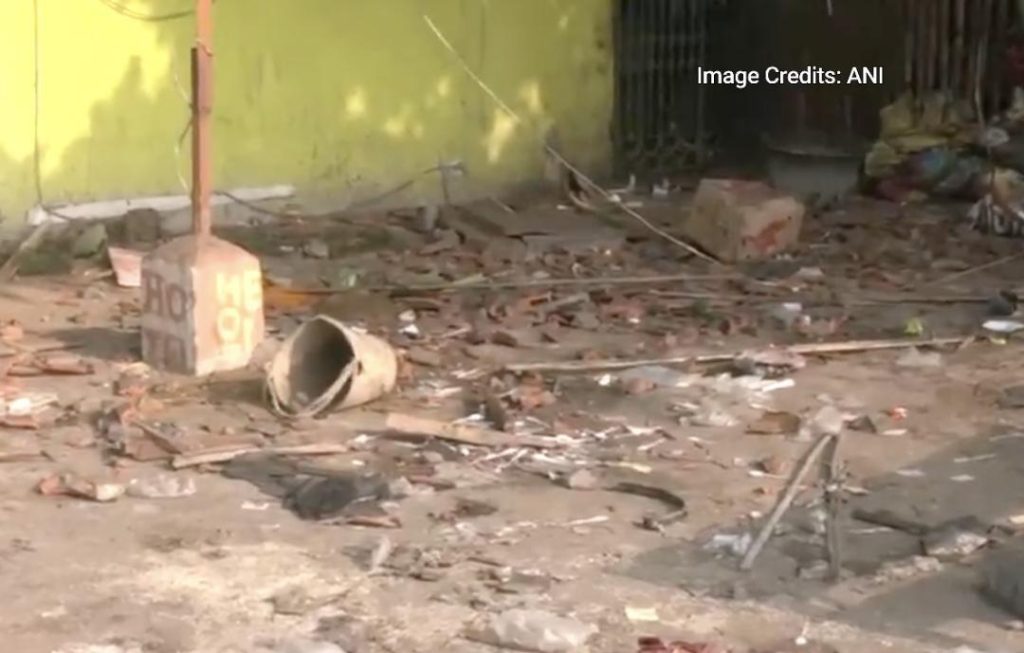
Title: 5,000 Disrupt Services & Pelt Stones at Bengal Railway Station during Protest against Waqf Act
In West Bengal, the ongoing protests against the Waqf Act took an ugly turn on Friday, as nearly 5,000 people disrupted train services near the Dhulianganga railway station. The protest, which started around 1 pm, led to the movement of the Kamakhya-Puri Express being affected, and the situation was further exacerbated by stone pelting by the protesters.
According to reports, the mob gathered at the railway station and began stoning the trains and damaging property. The protesters were reportedly demanding the withdrawal of the Waqf Act, which was passed by the West Bengal government in November. The Act aims to regulate and manage the waqf properties in the state, which are considered to be endowed by Muslims for charitable purposes.
The disruptions caused by the protesters led to the suspension of train services, causing inconvenience to thousands of passengers. The Eastern Railways, which operates the railway station, issued a statement saying that the movement of the Kamakhya-Puri Express was affected due to the protests. The statement added that the situation was brought under control by the authorities after some time.
An eyewitness, who was present at the scene, described the situation as chaotic. “Around 1 pm, the mob gathered at the station and started stone pelting. Many things were destroyed, and the signal couldn’t be passed. It was a very tense situation,” he said.
The protesters, who were mainly Muslims, were demanding that the Waqf Act be withdrawn, claiming that it was an attempt by the government to encroach upon their religious rights. The Act, they claim, will give the government control over the management of waqf properties, which will lead to their misuse.
The West Bengal government, however, has defended the Act, saying that it is necessary to ensure the proper management and regulation of waqf properties. The government has also claimed that the Act will benefit the Muslim community by providing them with better infrastructure and facilities.
The protests against the Waqf Act have been ongoing in West Bengal for several weeks, with protesters holding rallies and demonstrations across the state. The situation took a violent turn on Friday, with the disruptions at the Dhulianganga railway station being the most serious incident so far.
The incident has raised concerns about the safety and security of passengers and railway employees. The Eastern Railways has promised to take steps to prevent such incidents in the future, and has also appealed to the protesters to maintain peace and order.
The protests against the Waqf Act are a reflection of the deep-seated tensions and divisions that exist in West Bengal. The state has a long history of communal tensions, and the Waqf Act has become a flashpoint for these tensions.
The Act has been criticized by many Muslim organizations and individuals, who claim that it is an attempt by the government to encroach upon their religious rights. The Act, they claim, will give the government control over the management of waqf properties, which will lead to their misuse.
On the other hand, the West Bengal government has defended the Act, saying that it is necessary to ensure the proper management and regulation of waqf properties. The government has also claimed that the Act will benefit the Muslim community by providing them with better infrastructure and facilities.
The protests against the Waqf Act are a reminder of the importance of ensuring that the rights and interests of all communities are protected and respected. It is essential that the government and other stakeholders work together to address the concerns and fears of the Muslim community, and to ensure that the Act is implemented in a way that is beneficial to all.
In conclusion, the disruptions at the Dhulianganga railway station on Friday were a serious incident that highlights the need for calm and peaceful resolution of the protests against the Waqf Act. The incident has raised concerns about the safety and security of passengers and railway employees, and has also underscored the importance of ensuring that the rights and interests of all communities are protected and respected.






